| |
| |
AFAM Executive Committee |
| Prof. Stella Nkomo: President (University of Pretoria) |
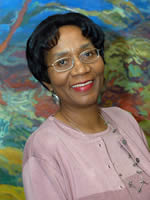 | Prof. Nkomo is a Professor in the Department of Human Resource Management at the University of Pretoria, South Africa. Her internationally recognized research on race and gender and diversity in organizations has been published in several journals. Her current research interests include leadership and change management in Africa. She is an Associate Editor for Organization, the critical journal of organization, theory and society, and the British Journal of Management. Professor Nkomo is the co-author of the recently published book Courageous Conversations, a collection of interviews and reflections on responsible leadership by South African Captains of Industry. |
| Dr. David Zoogah: Secretary (Morgan State University) |
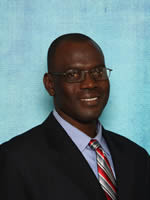 | Dr. Zoogah is Associate Professor of Business Administration at Morgan State University in Baltimore, USA. His current research focuses on Organizational Behavior, Human Resources Management, and Green Management particularly in emerging economies. His research has been published in several internationally recognized journals including the Journal of Applied Psychology, Asia Pacific Journal of Management, International Journal of Cross-Cultural Management, International Journal of Leadership Studies, Journal of Occupational and Industrial Psychology, ZeitschriftfürPersonalforschung, International Journal of Human Resources Management, and Journal of African Business (JAB). He is the international representative committee member of the OB Division of the Academy of Management, and former Chair of the Ethics and Social Issues track of the International Academy of Business Disciplines (IABD). He has won the Best Paper Proceedings of the Academy of Management Gender, Diversity and Organization (GDO) Division and Outstanding Reviewer for the OB Division. |
| Dr. Moses Acquaah: Treasurer (University of North Carolina at Greensboro) |
 | Dr. Acquaah is Associate Professor of Business Administration at the University of North Carolina at Greensboro, USA. His current research focuses on strategic management, entrepreneurship, and family businesses in emerging economies. His research has been published in several internationally recognized journals including the Strategic Management Journal, Human Relations, Journal of Business Research, Journal of International Management, and Journal of African Business (JAB). He serves on the editorial review boards of the JAB and the International Journal of Information Security and Privacy. He is the Academy of Management’s Business Policy and Strategy Division’s Global Representative for Africa, and an executive member of the International Academy of African Business and Development (IAABD). His work has won competitive research grants from organizations such as the Marion Ewing Kauffman Foundation, USA, the Family Owned Business Institute (FOBI), USA, and Emerald Publishing Group, U.K |
| Dr. Karel Stanz: Funding Coordinator (University of Pretoria) |
 | Dr. Stanz is HOD of the Department of HRM at the University of Pretoria and a former Chair of the department of HRM at the University of Johannesburg. Karel is a registered Industrial Psychologist and a Master HRM Practitioner. A passionate servant leader; proponent of corporate/academic partnerships; serves on the selection panel for the Deloitte "Best Company to Work For"; the Lead Academic Partner for the "Tomorrows Leaders Convention" and Chairman and Executive Director of the Human Capital Institute-Africa, which partners top corporations with university researchers and students to explore cutting-edge HR issues. He is a member of the various professional boards and institutions. His current research focuses on organisational behaviour, leadership, e-learning and talent management. |
| Dr. Paul Sears: Liaison (The University of Findlay) |
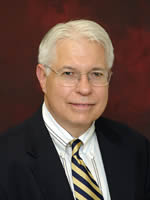 | Dr. Sears is Dean of the College of Business and professor at The University of Findlay in Findlay, Ohio. Prior to his appointment in 2006, he was Dean of the College of Business and Economics at Ashland University where he also held the Mitchell Chair in Administration and Economics. Paul serves on the ACBSP (Accreditation Council for Business Schools and Programs) Board of Directors as Treasurer, the Board of Directors of the Blanchard Valley Port Authority and the Board of Directors of the North Central Campus for Emerging Technologies as well as a member of the Executive Committee of the Africa Academy of Management, serving as External Liaison for the organization. Paul’s degree work includes a Ph.D. in Organizational Behavior at Case Western Reserve University; an MBA (Finance and International Business) from the University of Chicago; a Master of Science (Economics) from the London School of Economics, University of London; and undergraduate degrees in Accounting and Economics from Lake Erie College and Yale University. |
| Dr. Benson Honig: Liaison (McMaster University) |
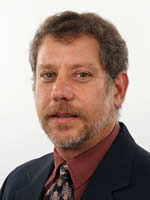 | Benson Honig (Ph.D. Stanford University) is the Teresa Cascioli Chair in Entrepreneurial Leadership, DeGroote School of Business, McMaster University. Studying entrepreneurship worldwide, his research includes over 40 articles covering business planning, nascent entrepreneurship, transnational entrepreneurship, social entrepreneurship, social capital, and entrepreneurship in environments of transition. Dr. Honig is the co- winner of the Grief award for highest five year impact article in entrepreneurship in 2009, as well as the most cited paper for JBV; 2003- 2009. He is an editor of ET&P, serves on six editorial boards, including JBV, JMS, and the Babson conference, and is the immediate past president of the Canadian Counsel of Small Business and Entrepreneurship. Dr. Honig has extensive experience living, working, and researching in both urban and rural African environments, and has personal familiarity with 13 African countries.
|
| Dr. Nceku Nyathi: Membership Coordinator (University of Cape Town) |
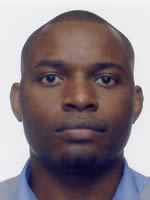 | Dr. Nyathi is a Senior lecturer in the Allan Gray Centre for Values Based Leadership at The Graduate School of Business, University of Cape Town and has extensive experience of researching management and organizations in Africa and Europe. He was part of the ABLE-Ghana Project funded by UK department for Business, Innovation and Skills (BIS), which aimed to put employability and entrepreneurship at the heart of teaching and learning in Ghanaian business schools - by initiating processes of professional renewal, employer engagement and institutional development. His PhD, awarded by the University of Leicester, School of Management, explored the "Organizational Imagination in African anti-colonial thought" and current research interests are primarily in the field of organization with a contextual focus on Africa, and secondarily on cross cultural management and leadership. An ecclectic range of topics include postcolonial theory, labour process, ethical leadership and critical pedagogic practices, and African management. |
| Dr. Eileen Kwesiga: Program Chair (Bryant University) |
 | Dr. Kwesiga had extensive experience in corporate America before going into Academia. She worked for Companies such as Sherwin-Williams, Progressive Insurance, Lincoln Electric and General Electric. In these organizations she worked on multi-million dollar projects implementing and overseeing installation of ERP (Enterprise Resource Planning) software such as SAP, BAAN, & SmartStream. She has worked as an accountant, software analyst and as a manager. Currently she is involved in Leadership, Human Resources and Diversity consulting ventures in multiple African regions. Her current research interests include cross-cultural issues, experiences and outcomes of non-dominant groups in organizations and appears in Journal of Vocational Behavior, Journal of Managerial Psychology, Journal of Interpersonal Violence, Employee Rights and Responsibilities Journal among others. |
| Dr. Elham Metwally: Program Coordinator (American University in Cairo) |
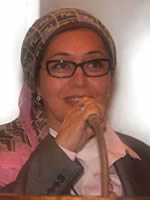 | Dr. Elham Metwally is an Adjunct Assistant Professor in the School of Business, the American University in Cairo. Before joining academia, Elham made more than a dozen years of experience in the realm of banking, namely in the Hong Kong and Shanghai Banking Corporation (HSBC). She earned her doctorate degree from Maastricht School of Management in the Netherlands, and her dissertation explored “The effect of managing change through information technology to achieving strategic competitiveness for private banks in Egypt. She serves on the Editorial Review Board, Africa Journal of Management, and she is a member of the Academy of Management in USA, the European Academy of Management (EURAM), the European Institute for Advanced Studies in Management (EIASM), the Middle East Council for Small Business & Entrepreneurship (MCSBE), and Holland Alumni Network in the Netherlands Organization for International Cooperation in Higher Education (NUFFIC). She is an active participant in the Academy of Management annual conferences. She has several publications and her research and teaching interests include strategic management, organizational behavior, human resources management, organizational development, banking, and entrepreneurship and small businesses. Her current research interests include research on Leadership effectiveness, motivation, and culture in Africa, diversity management, and human resources management in North Africa. She has published a number of book chapters, a book review, and authored and co-authored several articles that appear in several journals and books including the Canadian Journal of Administrative Sciences, Journal of International Finance and Economics, the International Journal of Strategic Management, among others. |
| Dr. Judy Muthuri: Membership Coordinator (University of Nottingham) |
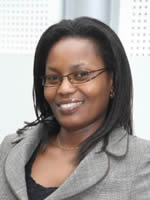 | Dr. Muthuri is an Assistant Professor of Corporate Social Responsibility at theInternational Centre for Corporate Social Responsibility (ICCSR), Nottingham University Business School, United Kingdom. Her current research is in the areas of corporate social investment; sustainable supply chain; human rights and Chinese Multinationals in Africa; social partnerships; corporations and development; and, CSR in Africa. Her published work appears in the British Journal of Management, Journal of Business Ethics, the Community Development Journal, and Journal of Corporate Citizenship. She has also published a number of book chapters, a book review and has co-authored a series of practitioner reports on stakeholder engagement and corporate community involvement in the United Kingdom for the Charities Aid Foundation. Dr. Muthuri has worked for over several years in the NGO sector in East Africa specialising in 'women and economic empowerment' and 'business and social development'. She is currently a Programme Adviser for the Comic Relief Trade Programme in the UK. She is a member of the ILO–Business School Network, and of various academic associations including The Academy of Management; British Academy of Management; European Group for Organizational Studies; and the International Academy of African Business. |
| Lance Stringer (Graduate School of Business, University of Cape Town) |
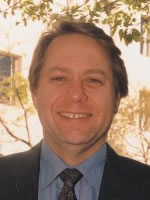 | Lance is a senior lecturer at the Graduate School of Business, University of Cape Town. He is also the Chief Information Officer (CIO) of the School and was additionally, for some years, the MBA Director of the School. Lance has taught courses in IT management, technology innovation and business strategy. He currently teaches critical thinking and cross-cultural differences in thinking, judgment and decision-making. His research interests are primarily in the area of cognition and culture.
Before joining the GSB Lance spent some 15 years in the corporate world where he has worked as a senior manager at KPMG, Old Mutual and Southern Life. His experience includes IT Management, IT Programme Management, Business Continuity Management, IS Auditing and IT Consulting. He has a BSc from University of South Africa and an MBA and MCom from the University of Cape Town and is currently reading for his PhD. |
| Constant D. Beugré (Ph. D. Rensselaer Polytechnic Institute) |
 | Constant D. Beugré is a professor of management at Delaware State University, College of Business where he teaches courses in organizational behavior and entrepreneurship at the undergraduate level and organizational leadership at the graduate level. Dr. Beugré is the chair of the department of business administration and has served as acting associate dean of the college of business from 2009 to 2011. Prior to joining Delaware State University, Dr. Beugré was an assistant professor of management and information systems at Kent State University, Tuscarawas Campus. Dr. Beugré was also a visiting fellow at Harvard University in 1996. His research interests include organizational justice, entrepreneurship and neuro-organizational behavior. Dr. Beugré has published three books and more than 50 refereed journal articles, book chapters, and conference proceedings. His publications have appeared in academic outlets, such as Organizational Behavior and Human Decision Processes, Decision Sciences, Journal of Business and Psychology, Journal of General Management, International Journal of Human Resource Management, International Journal of Manpower, Journal of Applied Behavioral Science, Journal of Applied Social Psychology, and Research in the Sociology of Organizations. |
| Dr. Margaret Jemima Crabbe |
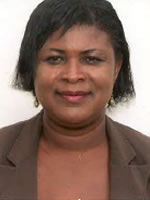 | Dr. Margaret Crabbe holds a Doctorate degree in Business Administration (Management Information Systems) from Edith Cowan University, Perth, Western Australia, MBA (Finance) University of Ghana. She teaches Management Information Systems at the graduate and undergraduate wings of Ghana Institute of Management and Public Administration. She also teaches International Business Management at the undergraduate level and as management consultant in specialized programs such as Goldfields. Dr. Crabbe has previously worked at senior managerial levels in the Central Bank of Ghana. As a research officer, Crabbe has tremendous experience in the financial markets in Ghana and overseas. She served on the Open Market Committee of Bank of Ghana, Editorial Committee of the Bank of Ghana Journal and participated in several International Central Banking Programs and conferences in the UK, Canada, USA, Nigeria and Ghana. Dr. Crabbe has published in International Journals such as the International Journal for Mobile Communications. Her research interest is in technology adoption, consumer and organizational behavior.
|
| Faith Wambura Ngunjiri, Communications Coordinator (Concordia College) |
 | Faith Ngunjiri is the Director of the Lorentzsen Center for Faith and Work, and an Associate Professor of Ethics and Leadership at the Offutt School of Business at Concordia College. She has research interests in women and leadership, particularly at the intersections of identities and geo-locations; spirituality in the workplace; and, culturally appropriate qualitative methods. Her work has been published in various journals including Journal of Management, Spirituality and Religion, International Journal of Qualitative Studies in Education, Journal of Business Communication and Journal of Educational Administration, among others. She is author of Women’s Spiritual Leadership in Africa (SUNY, 2010) and co-author of Collaborative Autoethnography with H. Chang and K. Hernandez (Left Coast Press, 2013). Faith serves as co-editor of two book series: Woman and Leadership (Information Age Publishing) and Palgrave Studies in African Leadership (Palgrave McMillan) and serves on the editorial boards of several journals. She earned a doctorate in leadership studies and masters in organization development from Bowling Green State University. |
| |
Sponsors |
| |
AFAM Bylaws |
Article I
Name | THE NAME OF THE Group shall be “The Africa Academy of Management (AFAM)”. |
Article II
Purpose | The Africa Academy of Management (AFAM) is a professional group whose members are bona fide members of The Academy of Management. The primary purpose is the development and improvement of member's capabilities for research and teaching of management in organizations in Africa. The secondary purpose is promotion of and advancing Management in Africa. AFAM provides an outlet for scholarly work on Management in African organizations. |
Article III
Objectives | The objectives of The Africa Academy of Management are to: - Foster the general advancement of knowledge and scholarship in the theory and practice of management among African scholars and/or academics interested in management and organization issues in Africa. Africa is defined broadly to include all of Africa and individuals of African descent in the Diaspora (i.e., The Carribean, South America, Europe, Asia, Oceania, Middle East, and North America).
- Perform and support educational activities that contribute to intellectual and operational leadership in the field of management within the African context.
|
Article IV
Membership | The basic requirements for membership in AFAM are: - Candidates shall be interested in and engaged in the theory, philosophy and practice of management through teaching, research, publication or practice.
- Candidates shall be either:
- Professors, lecturers, researchers, and/or graduate students of business administration and/or management in a research organizations, colleges or universities, or
- Others who have made contributions to management practice or theory or who are directly interested in management.
- Subject to the criteria above, either of the following shall constitute admission to membership in AFAM:
- Registration for and attendance at AFAM meetings; or
- Payment of membership dues annually to AFAM.
- Membership in AFAM requires concurrent membership in the Academy of Management.
- Membership in AFAM is available to all individuals meeting above criteria regardless of race, ethnicity, nationality, gender, language and religious or political beliefs.
|
Article V
Structure | - Officers:
- Elected officers of the Group which shall be known as the Executive Committee shall consist of the President, Secretary, Treasurer, Program Coordinators, Funding Coordinators, External Liaison Officers, and Membership Coordinators. The Immediate Past President will also be considered an officer. In order to facilitate continuity and order, the succession of leadership shall be as follows:
- President who shall be elected shall:
- Chair the Executive Committee meetings.
- Be the Chief Executive Officer for the organization, and be fully informed of all activities occurring within the organization.
- Be responsible for conducting the organizations activities in a manner that will assure the accomplishment of the AFAM's objectives, subject to:
- The Constitution, Bylaws, and professional policies of the Academy of Management.
- The Bylaws of the AFAM
- The concurrence of the Executive Committee in matters of policy.
- Preside at all meetings of the organization, but may delegate this responsibility to the Secretary at his/her discretion.
- Present a report on the status and progress of the organization at its annual business meeting.
- Serve as Immediate Past President Chair and active member of the Executive Committee for one year following their term as organization’s President.
- Secretary who shall be elected shall:
- Keep the minutes of all business meetings of AFAM and keep minutes of all Executive Committee and Annual AFAM meetings.
- Be responsible in maintaining a copy of AFAM's Program,
- Be responsible in maintaining a copy of AFAM's Program,
- Perform such other duties as may pertain to the office.
- Develop and maintain the web page of AFAM.
- Conduct surveys of AFAM members as needed.
- Treasurer who shall be elected shall:
- The Treasurer shall be an administrative person who is responsible to keep the financial records of AFAM.
- She/he shall be responsible for the funds of AFAM, issuance of checks (along with the President, constituting two signatories) issue checks, keep complete and accurate books of accounts showing all receipts and disbursements, and develop a financial report at the Annual Meeting.
- Perform such other duties as may pertain to the office.
- Program Coordinators who shall be elected shall:
- Act as Program Coordinators at the annual meeting of AFAM. In this capacity, the Program coordinator will have responsibility for designing and organizing the program aspects of the annual meeting. Attention should be given to professional development activities as well. This may consist of paper presentations and other relevant sessions that promote the objectives of interrogating, expanding and disseminating scholarship and research about management in Africa. In the developing the program, the coordinator(s) should work closely with the Academy of Management (where necessary) as well as seeking other possible collaborations.
- Perform such other duties as may be assigned by the President or Executive Committee of the Africa Academy of Management.
- Coordinate activities through the Executive Committee
- Serve on the Executive Committee.
- Act as Program Chair at the annual meeting. In this capacity, the Program Chair shall receive all program submissions and prepare them for the blind review process in compliance with the Academy of Management Guidelines.
- Funding Coordinator(s) who shall be elected shall be responsible for:
- Identifying possible funding sources to support the activities and mission of AFAM;
- Developing a fund raising strategy
- Coordinating with the President in approaching different funding agencies and/or pursuing funding opportunities
- Reporting annually to the Executive body on fund raising activities and outcomes, and
- Working with a committee if need be.
- Conducting outreach to agencies
- Overseeing Regional Representatives
- Providing timely feedback and progress reports, in both directions
- Participating in executive meetings
- Membership Coordinator(s) who shall be elected shall:
- Be responsible for maintain an electronic database of all AFAM members and all those who may be interested in AFAM's activities
- Actively work with regional representatives to recruit new members, and
- Work closely with the Treasurer to make sure that accurate records are kept of dues paying members;
- Any other role that may be assigned by the President.
- Regional Representatives who shall be appointed by the President shall:
- Represent the region to which he/she is assigned.
- Have a tenure of two (2) years.
- Be responsible for promoting AFAM to interested individuals in their representative regions.
- Work closely with the membership coordinators to recruit new members from their region to join AFAM
- Work closely with the External liaison Coordinators in matters involving External agencies in their region.
- Succession
- The following regions shall be represented: African Continent, The Caribbean, South America, North America, Australasia, Europe, and Asia
Members shall be elected to regional representatives before being elected to Membership Coordinator, External Liaison Coordinator, Funding Coordinator, Program Coordinator, Treasurer, Secretary, President, and Ex-Officio President. It is expected that each executive will build upon the outcomes of the past executive in that leadership function. - Tenure
- With the exception of Regional Representatives, each officer shall have tenure of three (3) years. The tenure of the regional representatives shall be limited to five years.
- Members of AFAM will pay annual membership dues which will be used for either one or all of the following:
- Support scholars and students of AFAM to attend AFAM or AOM meetings to present papers or participate in Professional Development Workshops and caucuses.
- Organize AFAM conferences
- Entertain (e.g., reception dinners, luncheons, or brunches) members during AFAM activities and conferences.
- Membership Dues
- Members of AFAM will pay annual membership dues which will be used for either one or all of the following:
- Support scholars and students of AFAM to attend AFAM or AOM meetings to present papers or participate in Professional Development Workshops and caucuses.
- Organize AFAM conferences
- Entertain (e.g., reception dinners, luncheons, or brunches) members during AFAM activities and conferences.
- Committees
- The following committees shall be instituted to fulfill the purposes defined therein:
Local Arrangement Committee shall be responsible for:
Organizing the operational aspects of the annual conference. Normally this committee will be composed of faculty members and/or employees of the host institution.
Liaison Committee shall be responsible for: - Establishing linkages and sponsoring joint activities with other groups. These groups may include the divisions of the academy (such as Personnel and Human Resources, International Management, Business Policy and Strategy, etc.), affiliates of the academy (such as the Asian Academy of Management, the Western Academy of Management, the Southern Academy of Management, Ibero-American Academy of Management, etc.), or external associations that share common interests (such as International Academy of African Business and Development, Leadership and Management Studies of Sub-Saharan Africa).
- Working closely with the liaison officers to establish links, if need be, with external groups.
- This committee will be composed of at least three members.
- Research and Award Committee shall be responsible for:
- Promoting and recognizing scholarship among African management academics. This committee will propose awards (such as "best article" award, "career achievement" award, and the like) to the Executive Committee for approval.
- Developing selection and evaluation procedures of candidates and making recommendations to the Executive Committee as to who should receive an award.
- This committee will be composed of at least five members.
|
Article VI
Election and Tenure
| During the inaugural period August 2009-August 2010 members meeting at the annual caucus in Chicago, Illinois, shall elect, by majority vote rule, the following executives: President, Program Officer, Secretary, and regional representatives who will establish an initial structure to AFAM and to commence working toward the achievement of the Group’s ultimate objective - affiliation with the Academy of Management.
Officers shall be elected by simple majority.
|
| Officers: | The term shall consist of a period of three years |
| The terms for the standing committees will be as follows: |
| Local Arrangement Committee | Renewed at the completion of each conference to be held every other year. |
| Liaison Committee | Tenure shall be for four (4) years. |
| Research and Awards committee | Tenure shall be for three (3) years |
| | | |
Article VII
Rule of Order | Business meetings of the AFAM shall be conducted in accordance with Robert's Rules of Order. |
Article IX
Dissolution | The assets of AFAM are irrevocably dedicated to professional, educational and scientific and/or charitable purposes. In the event of liquidation, dissolution, or the revocation of its charter or abandonment of its stated purposes, after providing for the payment of debts and obligations of the corporation, the remaining assets will not inure to the benefit of any private person or persons, but all such remaining assets will be distributed to a nonprofit professional educational and scientific organization, or to nonprofit professional educational and scientific organizations, which are organized and operated exclusively for professional educational and scientific, and/or charitable purposes which are exempt under Section (501)(c)(3) of the Internal Revenue Code, under which section the organization or organizations shall have established tax exempt status. |
Article X
Enactment | The provisions of the document shall become effective upon adoption of the document by 2/3 of the members of the Executive Committee and subject to approval by AFAM Members. |
| | |
Committees |
| Liaison Committee
Paul Sears - The University of Findlay, USA
Benson Honig - McMaster University, USA
Emmanuel Adegbite
Remi Ayoko
Rosamond Tompkins
Helen Duh
Program Committee
Eileen Kwesiga - Bryant University, USA
Elham Metwally - American University in Cairo, Egypt
Onome Ighoauonha
Lutisha Vickerie
Benson Honig - McMaster University, USA
Miguel Rivera-Santos - Babson College, USA
Remi Ayoko
Constant Beugre - Delaware State University, USA
Abebe Beyene
Marco Lam
Samuel Sejjaaka - Makerere University Business School, Uganda
W. Byabashaija
Thomas Senaji - Kenya Methodist University, Kenya
Solange Nwoah - Maharishi University of Management, USA
Thuso Mphela
Joseph Kamau
Theresa Dominic - University of Dar es Salaam, Tanzania
Lemayon Melyoki - University of Dar es Salaam, Tanzania
Alpha Ayande
Nceku Nyathi - Open University, UK
Kofi Dadzie - Georgia State University, USA
Vincent Bagire
| Membership Committee
Nceku Nyathi - Graduate School of Business, University of Cape Town Judy Muthuri - Nottingham University Business School, UK Thomas Senaji - Kenya Methodist University, Kenya Abeba Mengistu - University of Addis Ababa, Ethiopia Thuso Mphela - University of Botswana, Botswana Yetunde Anibaba - Lagos Business School, Nigeria Miguel Rivera - Babson College, USA Betty Jane Punnetti - University of West Indies-CaveHill, Barbados |
| | |
Mission |
| The mission of AFAM is to (1) “foster the general advancement of knowledge and scholarship in the theory and practice of management among African scholars and/or academics interested in management and organization issues in Africa (defined broadly to include all of Africa and individuals of African descent in the Diaspora - i.e., Caribbean, South America, Europe, Asia, Oceania, Middle East, and North America)” and (2) “perform and support educational activities that contribute to intellectual and operational leadership in the field of management within the African context.” | |




















